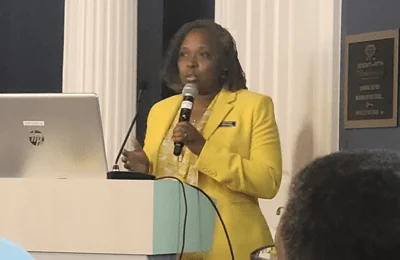The recent news that some of the state’s wealthier school districts are eligible for property tax relief reveals not just the flaws in the General Assembly’s 2017 evidence-based funding formula that initiated the relief program, but the entire K-12 funding system itself, says former State Rep. Jeanne Ives (R-Wheaton). Ives was a member of the House when the funding bill became law in August 2017, and served on committees that reviewed the proposed funding plan. She voted against the bill on the House floor.
“Some of the districts eligible for the grants spend well beyond what other districts spend and it’s not reflected in the performance results of the students,” Ives told the DuPage Policy Journal. “You want education reform and lower property taxes, spend less and demand better student outcomes.”
One exemplar district is the Oak Park and River Forest High School District 200 (OPRF). The district spends well above what’s considered adequate funding under the new evidence-based law, according to a review of the district’s spending by the Illinois State Board of Education (ISBE). And yet it was still one of 28 districts eligible -- some of the others of which are far below adequate funding levels -- for property tax relief under the law based in large part on their comparatively high tax rates. OPRF will receive around $3.8 million in state funds to offset a $5.8 million abatement, district officials said in a February 5 statement.

In 2017, the district spent nearly twice as much per student per year ($23,966) as nearby Wheaton-Warrenville District 200 ($13,280) yet the student performance results in both districts were nearly the same, according to the Illinois Report Card. In both, a large percentage of students failed to meet minimum proficiency levels in English and math.
“It’s time for people to ask what kind of return they are getting for their taxes,” Ives said.
OPRF also happens to be home to some of the key players responsible for the new school funding scheme, which appropriated $350 million to the schools with $50 million of it set aside for property tax relief. Tony Smith was the State Superintendent of Schools under former Governor Rauner; Michelle Turner Mangan, chairs the professional review panel in charge of recalibrating the school funding model; Ralph Martire, candidate for the OPRF school board, was one of the architects of the 2017 evidence-based bill. As taxpayers in the district, all will benefit from the property tax relief, which is funded by taxpayers statewide.
Another architect of the school funding bill, Mike Jacoby, director of the Illinois Association of School Business Officials, said that property tax relief might have to be redirected to the schools that are far below adequate funding levels yet still have comparatively high property taxes.
“We should probably look at isolating the lower funded schools when we go through the appropriation process,” Jacoby said. “We’ll be involved in those discussions when the budget discussions start heating up.”
Illinois’ fiscal year begins on July 1.
Ives said that the funding system needs a much bigger fix if residents ever want to see the end of tax increases. She pointed to a downstate district, Effingham Unit 40, which did not receive property tax relief, that placed a sales tax referendum on the April ballot to help fund education. The Effingham Daily News reported that 55 counties in Illinois have the tax, including many in the area: Jasper, Richland, Shelby, Coles, Cumberland. Fayette County will also ask voters to approve a sales tax referendum in the spring.
“They know they can’t get higher property taxes approved so their going the sales tax route,” Ives said. “It all goes back to the fact no one thought of the overall burden on the taxpayers when the new funding formula was approved."
"Some districts are forgoing a higher property tax rate that may make them eligible for this new property tax relief grant in the future and are instead increasing the local sales tax burden to fund education," she added. "The whole school funding formula approved by the education establishment is full of the games and traps like this that actually lead to less equitable funding.”






 Alerts Sign-up
Alerts Sign-up